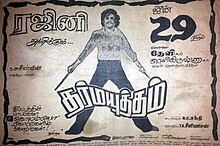Dharma Yuddam (transl. War for honour) is a 1979 Indian Tamil-language action film directed by R. C. Sakthi. It stars Rajinikanth and Sridevi. The film was released on 29 June 1979.[1]
| Dharma Yuddham | |
|---|---|
 Poster | |
| Directed by | R. C. Sakthi |
| Story by | Peter Selvakumar |
| Produced by | T. R. Srinivasan |
| Starring | Rajinikanth Sridevi Thengai Srinivasan |
| Cinematography | N. Balakrishnan |
| Edited by | G. Radhakrishnan |
| Music by | Ilaiyaraaja |
Production company | Charusuchithra Films |
Release date |
|
Running time | 134 Minutes |
| Country | India |
| Language | Tamil |
Plot
editVijay's parents are killed by Robert. He is adopted and brought up by Thiyagarajan. He comes to love Thiyagarajan's daughter as his own sister. He becomes a successful, soft-spoken, kind yet reclusive business man and is sought by Chitra for an interview. He falls in love while Manju, and his sister falls in love with a photographer. Though initially against the match, Vijay realizes that his sister's lover is hardworking, sincere and is not after money. All seems to go well until one day Manju is found dead near the pier.
Robert, their family friend, is an illegal organ trader and sells custom requested eyes. He is the one who kidnapped and killed Manju. Vijay has a weakness. On full moon night, he has an alter-ego that takes over which is extremely violent, overtly strong and incredibly dangerous as it was the day he lost his biological family. This was Vijay's biggest secret which he hid from everybody except for Chithra, whom he trusted and loved. His adoptive father and later, his sister chain him up in a room to ensure he does not hurt others and more importantly himself. When Vijay finds out that Robert has been stealing eyes and is responsible for all the deaths, he goes after him but is overpowered by Robert's henchmen. While Robert was completing his last ever deal, the full moon rises and Vijay, in his alter-ego, kills every single one of them in rage. He is acquitted both on account of his condition and that the dead are criminals.
Cast
edit- Rajinikanth as Vijay[2]
- Sridevi as Chitra[2]
- Manorama
- Thengai Srinivasan as Robert[2]
- Major Sundarrajan as Thiyagarajan
- Suruli Rajan as Vijay's friend
- S. A. Ashokan as Azhagappan
- V. Gopalakrishnan as Dr. Amarnath
- Sachu as Geetha
- Pushpalatha as Chitra's mother
- S. R. Veeraraghavan as Ramanathan
- Jaggu as Henchman
- Lakshmi Sree as Manju
- Master Chandrasekar as Child vijay
- Y. G. Mahendran (guest appearance)
- Selvaraj
- Chakkaravarthi
Soundtrack
editThe soundtrack was composed by Ilaiyaraaja.[3][4] The song, "Oru Thanga Radhathil" is set in Mohanam raga and "Aagaya Gangai" is set in Madhyamavati.[5][6]
| No. | Title | Lyrics | Singer(s) | Length |
|---|---|---|---|---|
| 1. | "Oru Thanga Radhathil" | Kannadasan | Malaysia Vasudevan | 4:27 |
| 2. | "Aagaya Gangai" | M. G. Vallabhan | Malaysia Vasudevan, S. Janaki | 4:38 |
| 3. | "Ada Poya" | Kannadasan | S. P. Sailaja | 4:45 |
| 4. | "Disco Sound" | Hari | Hari, Ramola | 3:34 |
| Total length: | 17:24 | |||
Reception
editThis section is empty. You can help by adding to it. (May 2024) |
Medical accuracy
editDaniel, a consulting psychiatrist, criticised the lead character's condition, that he becomes invincible and violent on a full moon night, as a medically inaccurate myth, noting its similarities to werewolf theories.[7]
References
edit- ^ "'தர்மயுத்தம்' வெளியான நாள்: கமலின் அண்ணன் இயக்கிய படத்தில் நாயகனாக ரஜினி!". Hindu Tamil Thisai (in Tamil). 29 June 2021. Archived from the original on 29 June 2021. Retrieved 29 June 2021.
- ^ a b c Ramachandran, Naman (2014) [2012]. Rajinikanth: The Definitive Biography. New Delhi: Penguin Books. p. 95. ISBN 978-0-14-342111-5.
- ^ "Dharma Yuddham (Original Motion Picture Soundtrack) – EP". Apple Music. Archived from the original on 29 May 2023. Retrieved 29 May 2023.
- ^ "Dharma Yuddham Tamil Film EP Vinyl Record by Ilayaraaja". Macsendisk. Archived from the original on 4 February 2023. Retrieved 29 May 2023.
- ^ "இளையராஜா 75". Dinamani (in Tamil). 17 June 2018. Archived from the original on 3 February 2023. Retrieved 23 April 2024.
- ^ Mani, Charulatha (30 August 2013). "The power of three". The Hindu. Archived from the original on 24 June 2021. Retrieved 23 April 2024.
- ^ Shekhar, Arunkumar (21 March 2018). "Oh, the lunacy: Debunking myth in Dharma Yuddham". The New Indian Express. Archived from the original on 25 October 2020. Retrieved 10 April 2024.
External links
editThis article needs additional or more specific categories. (April 2024) |